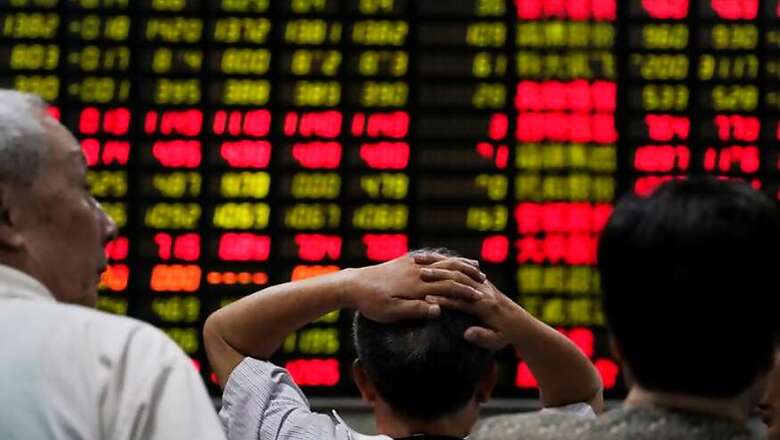
views
London: Europe's share markets, bond yields and the euro all inched higher on Tuesday, as mildly reassuring signals from China's economy helped limit worries about a potential second wave of coronavirus infections.
The mood was decidedly fragile, with five new virus cases in Wuhan - the original epicentre of the outbreak - renewed trade tensions and a tussle over negative U.S. interest rates all part of the mix.
London's FTSE, Frankfurt's DAX and Milan and Madrid clawed higher early on, but France's CAC40 and Wall Street S&P 500 futures were stuck in the red after Asia had struggled overnight too.
Global stocks have rebounded sharply in recent weeks as both Asia and Europe's big economies have been able to stem coronavirus outbreaks. It has triggered a so-called fear of missing out, or "FOMO", from investors.
But uncertainty has remained.
"We have had a rally that has not been loved by everybody," said SEB investment management's global head of asset allocation Hans Peterson.
"That rally might continue for a while longer, but we have probably gone on to a bit of a consolidation phase for now," he said, adding that how quickly China's economy can reopen and then how Europe fares in the coming weeks will both be key.
The latest signals from China had something for both the bulls and the bears.
As well as Wuhan's five new cases, China reported that factory prices dropped at the fastest rate in four years in April and it emerged that Beijing had suspended imports from four large Australian meat processors.
But there was the first rise in car sales in 22 months to cheer and China's foreign ministry also stressed the benefits of the recent Phase 1 U.S. trade deal following a report that some officials were reconsidering the agreement.
MSCI's broadest index of Asia Pacific shares outside of Japan had ended down 0.8%, snapping two straight sessions of gains.
Hong Kong's Hang Seng was among the hardest hit, down 1.45% followed closely by Australia which closed 1% lower. South Korea's KOSPI faltered 0.7% too but China's blue-chip CSI300 index managed to recover from an early dip.
German Angst
Fund managers largely expect equity markets to stay the course through June and avoid retesting March lows given the massive monetary stimulus provided by the U.S. Federal Reserve and other major central banks.
Late on Monday, the Fed said it would start purchasing shares of exchange-traded funds that invest in bonds, though policymakers also downplayed the likelihood of its interest rates being cut into negative territory.
That had kept the dollar firm in Asia, but the euro gradually regained ground in European trading, leaving it up 0.1% at $1.0819. The Japanese yen recovered an overnight loss of about 1% to sit at 107.55 per dollar though the Aussie dollar stayed subdued.
In commodity markets, oil prices climbed following an unexpected commitment from Saudi Arabia to deepen production cuts in June.
Brent crude futures climbed to a high of $30.11 a barrel and were up 0.2%, or 6 cents, at $29.69, reversing some of the previous session's losses. The benchmark fell $1.34 on Monday.
U.S. West Texas Intermediate (WTI) crude futures were up 0.91%, or 23 cents, at $24.37 after touching a high of $24.77.
Spot gold was a tad higher at $1,703 an ounce, while Italian and Spanish bonds managed to shrug off news that the world's largest asset manager BlackRock was "reviewing" its overweight position on southern euro zone debt.
The firm cited the recent German constitutional court ruling that the European Central Bank had overstepped its mandate with its 2015 bond purchase programme, which it said risked undermining the ECB's independence and might limit its bond-buying stimulus.
"This (the ruling) comes as the ECB's actions to cushion the pandemic's fallout already looked meek compared with the U.S. Federal Reserve's," BlackRock said in a note. It also "threatens to fuel fragmentation within the euro area in the long run," it added.



















Comments
0 comment